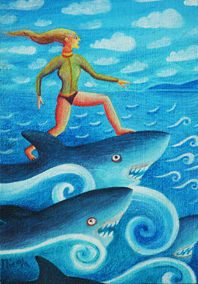 Don’t let anyone tell you what your dreams mean. And never do that to anyone else. This is the golden rule of dream-sharing.
Don’t let anyone tell you what your dreams mean. And never do that to anyone else. This is the golden rule of dream-sharing.
One of the great contributions of the American dreamwork movement has been to insist that dreams belong to the dreamers. As Henry Reed, a PhD in psychology and one of the founders of the movement, likes to say, “dreaming is too important to be left to psychologists.”
Montague (“Monte”) Ullman, a clinical psychiatrist, made a giant contribution when he declared that none of us have the right to tell another person what his or her dream means, based on any certification or presumed authority. In commenting on each other’s dreams, we should begin by saying, “If it were my dream,” making it clear that we are offering our personal associations and projections, not presuming to tell the dreamer the definitive meaning of his or her dream.
The work and example of Henry Reed, Monte Ullman, Jeremy Taylor and grassroots dreamwork circles all over the North American map have helped to return dreams to the dreamers, affirming that we don’t need to be doctors or shrinks to offer helpful comments on someone else’s dreams. “Perhaps the most significant development concerning dreams in the latter decades of the twentieth century is returning them to their rightful owner, the dreamer,” says Henry Reed. He is right.
If you are commenting on someone else’s dream, you can do little wrong as long as you follow the simple rule that you will preface your opinions and associations by saying “if it were my dream.” You will not presume to interpret another person’s dream. You are absolutely free to give your own ideas on the meaning of the dream, but you will do that by pretending that the dream is your own. You will own your own projections instead of foisting them on the other person. You will not only help to guide the dreamer towards grasping the meaning of a dream; you will help her to claim her power to determine the meaning of her dreams, and her life, for herself.
You listen to a dream, you ask for the dreamer’s feelings on waking (which are always the first and best clues to what is going on in the dream) and you run a quick reality check, asking the dreamer what she recognizes from the dream in the rest of her life and whether any of it could manifest in the future, literally or symbolically.
Then you offer your comments, starting with the phrase, “if it were my dream”. As long as you follow this protocol, you are free to bring in any associations, feelings or memories the dream arouses in you, including dreams of your own that may come to mind. Often we understand other people’s dreams best when we can relate them to our own dream experiences.
For example: If the dreamer has told you a dream in which he/she is running away from a bear, you may recall a dream of your own in which you hid from a bear – before you discovered that the bear was an ally. Your own experience may lead you to say, “If it were my dream, I would like to go back into the dream and meet the bear again and see whether it might be an ally”. You are now doing something more useful than merely interpreting the dream; you are gently guiding the dreamer to take action on the dream.
It is very rewarding to receive a totally different perspective on a dream, so sharing in this way with strangers can be amazingly rewarding – as long as the rules of the game are respected.
The fact that we may be highly intuitive, and highly skilled as dream interpreters, does not give us the right to take people’s power away by telling them what their dreams mean – even (and perhaps especially) when we are convinced we are “right” in our reading of what is going on in the dream.
Let’s say you dream of sharks. Look up “shark” in a dream dictionary and you might find an entry like this:
To dream of sharks represents terrifying vulnerabilities you have that make you feel like you can’t do anything accept wait for some very negative event to slowly overtake you, or destroy you.
Well maybe, or maybe not. If you woke terrified, maybe some of that would apply. But what if you woke with a sense of exultation, as Nicola did when – after weathering a rough patch in her life – she dreamed of herself riding sharks through a choppy sea? She proceeded to create the wonderful painting above with the energy and joy of this dream. The online dream dictionary I just quoted gives no guidance on the variants of a “shark dream”, makes no reference to the dreamer’s feelings and personal situation, and provides no clue about how to work with a dream image in the direction of resolution and healing.
Let’s say you were scared by sharks in a dream, and you were still scared when you woke
up, and that stock interpretation from the dream dictionary does feel like it could apply to you. If this were my dream, I would want, first, to compare the situation of my dream self with that of my waking self. Where, in regular life, do I feel there are “sharks in the water”? In exploring possible answers to that question, my mind would range over a whole series of scenarios, from the risk of actually encountering a shark in the ocean (I’m an Aussie, and a swimmer), to people at work who may have the business ethics of a shark, to the possibility that what I fear in the water is an ally waiting to be recognized.
up, and that stock interpretation from the dream dictionary does feel like it could apply to you. If this were my dream, I would want, first, to compare the situation of my dream self with that of my waking self. Where, in regular life, do I feel there are “sharks in the water”? In exploring possible answers to that question, my mind would range over a whole series of scenarios, from the risk of actually encountering a shark in the ocean (I’m an Aussie, and a swimmer), to people at work who may have the business ethics of a shark, to the possibility that what I fear in the water is an ally waiting to be recognized.
I would remember how I once worked with a Vietnam vet who was terrified by a great white shark in a dream. I told him that if it were my dream, I would want to go back inside the dream, through conscious dream reentry, and confront the shark ans see what I needed to do about it. When he found the courage and focus to do this, he discovered something extraordinary: that his dream shark was an ally he could claim in his battle with cancer. When he proceeded to imagine the shark swimming through his body, eating the cancer cells, his doctors found he had beaten the disease. Now, whenever he goes swimming, he pictures himself swimming with the shark, or swimming as the shark.
Whatever dream you share with me, I am likely to tell you that, if it were my dream, it requires action.
For a fuller discussion on how to “talk and walk” dreams, please see my books The Three “Only” Things and Active Dreaming. To practice dreamwork in fun, high-energy and mutually empowering ways, with a global community of active dreamers, please join my next online course at Spirituality & Health; it starts on February 7.
Shark Rider by Nicola Daniels

